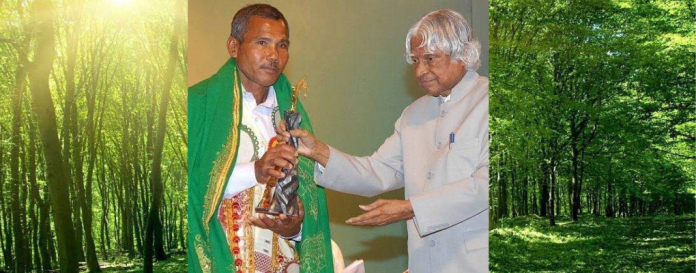
While on one hand we mercilessly chop down trees and talk about climate change, on the other hand, there is a man whose sole undertaking for over 30 years has been to plant and tend for trees. Yes, he is none other than Jadav “Molai” Payeng, loving called Forest Man, an Indian environmentalist, forestry worker and 2013 Padma Shri awardee who created India’s only man-made forest.
The man from Jorhat, Assam turned the sandbar of the river Brahmaputra, Majuli, and the biggest river island in the world into a 1,360 acre/ 550 hectares forest now named after him – The Molai forest.
Payeng’s journey began at the age of 16 when he planted 20 bamboo trees to save snakes that were dying on account of excessive heat and getting washed ashore the tree-less sandbar. What he learned from a botanical scientist at an early age helped him create an abundant vegetable farm and become a conservationist planting bamboo trees, then cotton seeds and then all different kinds of trees to create a forest.
A local ‘Mising’ tribesman, he then contracted a job in 1979 with the social forestry division of Golaghat district when it launched a tree plantation initiative to forest 200 hectares at Aruna Chapori in Jorhat district. After 5 years and having planted over 1000s of trees, when the forest ministry decided to move the laborers to another site, Molai knew he wanted to tend to those trees and continue to plant even more trees. The forest filled with bamboo trees soon expanded with trees like valcol, arjun (Terminalia arjuna), ejar (Lagerstroemia speciosa), goldmohur (Delonix regia), koroi (Albizia procera), moj (Archidendron bigeminum) and himolu (Bombax ceiba).

What started as a self-initiative grew into a passion. The man-made forest, which grew from 200 hectares to 550 hectares now houses Bengal tigers, Indian rhinoceros, monkeys, deer, rabbits, reptiles, birds and even a herd of 100 visiting elephants. This forest completed and cared for almost single-handedly, by Jadav Molai Payeng, is the perfect combination of a sustainable environment, ecological balance, and Green Planet initiatives.
In the words of Yadav, “It’s not as if I did it alone, you plant one or two trees, and they have to seed. And once they seed, the wind knows how to plant them, the birds here know how to sow them, cows know, elephants know, even the Brahmaputra river knows. The entire ecosystem knows.”
Only in 2008, when the forest authorities once again returned to look for a herd of missing elephants did they realize their tree planting initiative, had turned into a dense forest with wildlife finding a home here. Molai found his place in the sun!
He has received awards and honored by,
- School of Environmental Sciences, Jawaharlal Nehru University (April 2012)
- Indian Institute of Forest Management during their annual event Coalescence (October 2013)
- Padma Shri, the fourth highest civilian award of India (February 2015)
- An honorary doctorate degree from Assam Agricultural University and Kaziranga University

His life is also documented,
– by Jitu Kalita, ‘The Molai Forest’, which was screened at the Jawaharlal Nehru University in 2012, and,
– by William MacMaster in ‘Forest Man, 2013, which went on to win the Best Documentary at the Emerging Filmmaker Showcase in the American Pavilion at the 2014 Cannes Film Festival.

Binita, his wife, and his 3 children (two sons and a daughter) live with him. Their only source of income is the milk that they get from their cattle. With all the accolades, this humble man continues to live in the forest he created not abandoning his trees for any city lights.
